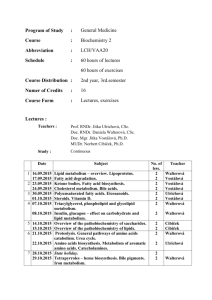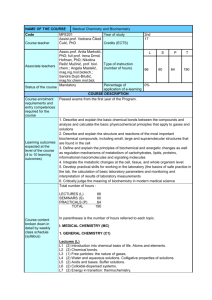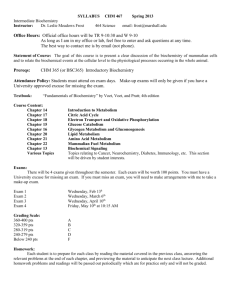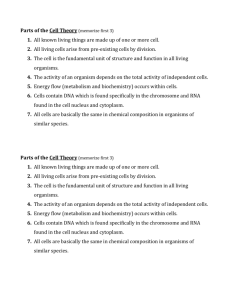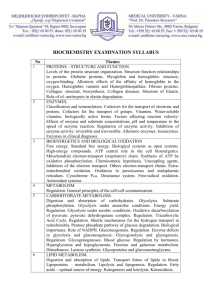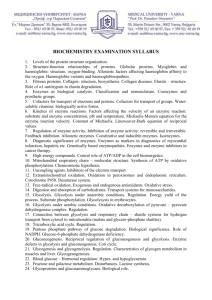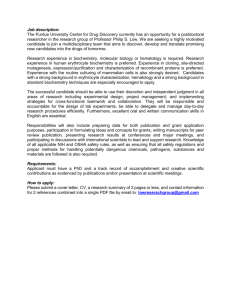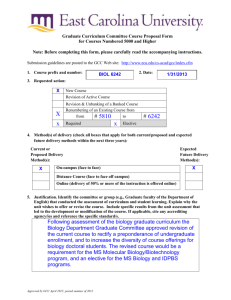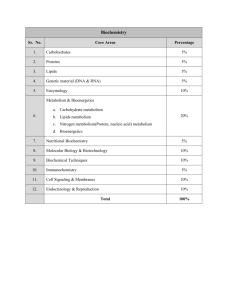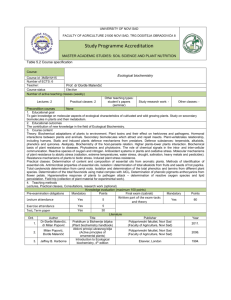LCH/VAB21
advertisement
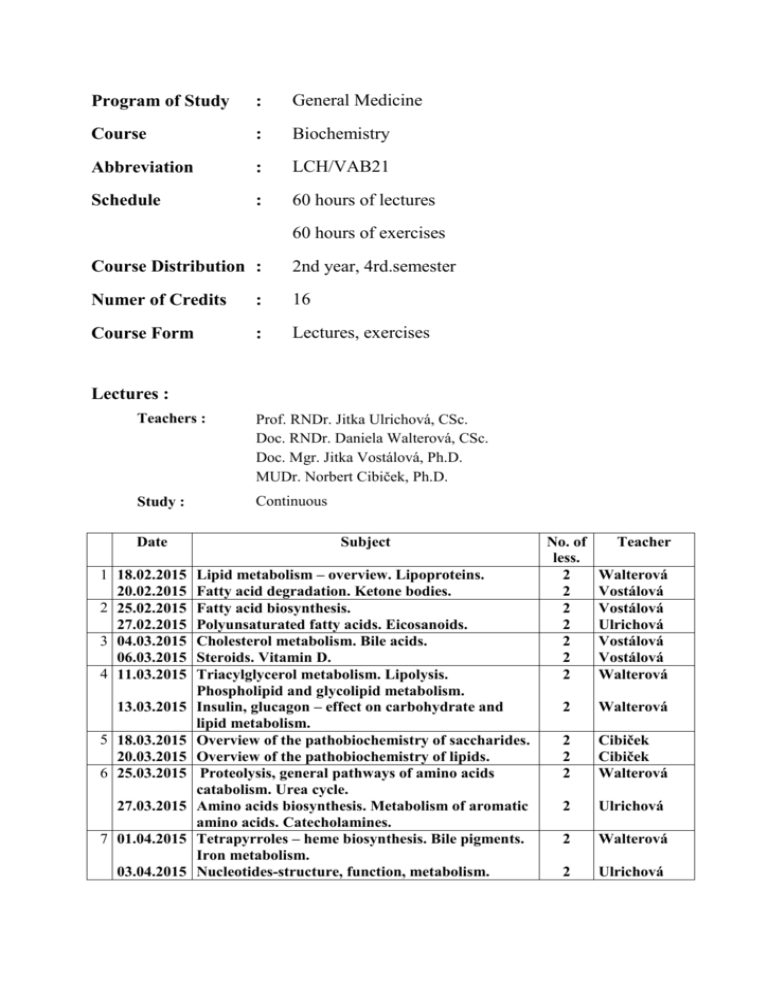
Program of Study : General Medicine Course : Biochemistry Abbreviation : LCH/VAB21 Schedule : 60 hours of lectures 60 hours of exercises Course Distribution : 2nd year, 4rd.semester Numer of Credits : 16 Course Form : Lectures, exercises Lectures : Teachers : Prof. RNDr. Jitka Ulrichová, CSc. Doc. RNDr. Daniela Walterová, CSc. Doc. Mgr. Jitka Vostálová, Ph.D. MUDr. Norbert Cibiček, Ph.D. Study : Continuous Date 1 18.02.2015 20.02.2015 2 25.02.2015 27.02.2015 3 04.03.2015 06.03.2015 4 11.03.2015 13.03.2015 5 18.03.2015 20.03.2015 6 25.03.2015 27.03.2015 7 01.04.2015 03.04.2015 Subject Lipid metabolism – overview. Lipoproteins. Fatty acid degradation. Ketone bodies. Fatty acid biosynthesis. Polyunsaturated fatty acids. Eicosanoids. Cholesterol metabolism. Bile acids. Steroids. Vitamin D. Triacylglycerol metabolism. Lipolysis. Phospholipid and glycolipid metabolism. Insulin, glucagon – effect on carbohydrate and lipid metabolism. Overview of the pathobiochemistry of saccharides. Overview of the pathobiochemistry of lipids. Proteolysis, general pathways of amino acids catabolism. Urea cycle. Amino acids biosynthesis. Metabolism of aromatic amino acids. Catecholamines. Tetrapyrroles – heme biosynthesis. Bile pigments. Iron metabolism. Nucleotides-structure, function, metabolism. No. of less. 2 2 2 2 2 2 2 Teacher Walterová Vostálová Vostálová Ulrichová Vostálová Vostálová Walterová 2 Walterová 2 2 2 Cibiček Cibiček Walterová 2 Ulrichová 2 Walterová 2 Ulrichová 8 08.04.2015 Nucleic acid – analysis. 10.04.2015 Biosynthesis of extracellular proteins. Osteosynthesis. 9 15.04.2015 Gastrointestinal digestion and absorption. 17.04.2015 Biologically important radicals. Oxidative stress. Antioxidants. 10 22.04.2015 NO - Biosynthesis and function. 24.04.2015 Biochemistry of muscle contraction – energy supply in skeletal and muscle heart. 11 29.04.2015 Biochemistry of neurodegenerative diseases. Biochemistry of vision. 01.05.2015 State holiday 12 06.05.2015 Minerals, trace elements – metabolic and biological role. 08.05.2015 State holiday 13 13.05.2015 Detoxification function of the liver. 15.05.2015 Metabolism of xenobiotics. 14 20.05.2015 Biochemical markers in clinical diagnosis I. 22.05.2015 Biochemical markers in clinical diagnosis II. 15 27.05.2015 Biochemical markers in clinical diagnosis III. 29.05.2015 Intermediary metabolism – an overview. 2 2 Ulrichová Walterová 2 2 Cibiček Ulrichová 2 Cibiček Walterová 2 2 Ulrichová 2 2 Cibiček 2 2 2 2 2 2 2 Cibiček Cibiček Cibiček Cibiček Cibiček Ulrichová Exercises : Leading Teacher : Mgr. Pavel Kosina, Ph.D. Study : Continuous Week from-to 1 2 3 4 5 Subject 16.02. – 20.02.2015 Information sources, databases. Laboratory training. 23.02. – 27.02.2015 Enzymes I. Introduction: nomenclature, structure, factors influencing enzyme activity. Demonstration of substrate specificity of -amylase and sucrase. Determination of optimum temperature for trypsin. 02.03. – 06.03.2015 Enzymes II. Determination of Michaelis constant of alkaline phosphatase (ALP) in serum. 09.03. – 13.03.2015 Enzyme III. Enzymes important in diagnostic. Warburgs´ optic test. Determination of lactate dehydrogenase (LD) activity in serum. Determination of aspartate aminotransferase (AST) and alanine aminotransferase (ALT) activity in serum. 16.03. – 20.03.2015 Immunoanalytic methods. Point of care testing. Determination of specific antigen by ELISA method. Determination of rheumatoid factor in No. of Less. 4 4 4 4 4 6 23.03. – 27.03.2015 7 30.03. – 03.04.2015 8 9 06.04. – 10.04.2015 13.04. – 17.04.2015 10 20.04. – 24.04.2015 11 13 27.04. – 01.05.2015 01.05. state holiday 04.05. – 08.05.2015 08.05. state holiday 11.05. – 15.05.2015 14 15 18.05. – 22.05.2015 25.05. – 29.05.2015 12 Completed by : Requirements : Literature : serum by LFT. Metabolism of saccharides. Determination of glucose in blood by glucometer. Oral glucose tolerance test (GTT). Determination of glucose and ketones by diagnostic test strips. Determination of glycated hemoglobin. Lipid metabolism. Lipid profile – evaluation of diagnostically important parameters in serum (total cholesterol, HDL-cholesterol, triglycerides). Determination of diagnostically important atherosclerosis parameters in serum (total cholesterol, HDL-cholesterol, triglycerides). Chapters from biochemistry (presentation). Amino acids metabolism. Digestion of proteins. Main metabolic pathways of amino acids. Renal function tests. Determination of creatinine in serum and urine. Determination of cystatin C in serum. Clearance and glomerular filtration calculations. Tetrapyrrols metabolism. Determination of hemoglobin in blood. Determination of bilirubin in serum. Test for blood in faeces and urine. Gallstone analysis. Revision – regulation and integration of key metabolic pathways. Revision – regulation and integration of key metabolic pathways. Determination of gastric output. Microscopy of urinary sediment. Urinalysis, detection of selected parameters in urine Acid-basic equilibrium. Practical test – clinical biochemistry methods. 4 4 4 4 4 4 4 4 4 4 Course unit credit 100% presence in practical lecture; obtain at least 70 % points in continuous test/or at least 70 % points in course unit credit test on principles of methods and calculations in chemistry; presentation of one selected biochemical topic; pass the final practical test Champe P. C., Harvey R.A.: Biochemistry (6th ed.), Lippincott Williams & Wilkins 2013. Devlin T.M. Textbook of biochemistry with clinical correlations (7th ed.), John Wiley & Sons, Inc. 2010. Murray R.K., Bender D.A., Botham K.M., Kennelly P.J., Rodwell V.W., Weil P.A. Harpers Illustrated Biochemistry (29th ed.), Lange Medical Book 2012. Koolman J. Color Atlas of Biochemistry (3rd ed.), Georg Thieme Verlag 2012 Newsholme E., Leech T. Functional Biochemistry in Health and Disease (2nd ed.), Wiley-Blackwell, 2010 Dvořáčková S., Dvořák Z., Valentová K., Vičar J. Biochemistry. Laboratory classes. 2007.
